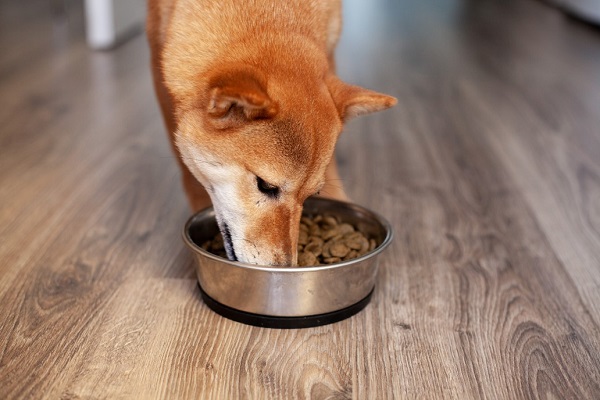Has your dog been diagnosed with any heart disease? In that case, you need not worry as there are some ways in which you can manage such conditions with proper nutrition.
All you have to do is talk to the vet and figure out a “low-sodium diet” that helps treat the heart disease that the dog is suffering from.
Has your doctor ever told you to reduce the sodium that you have in your food? Has this happened to anyone else you know? There could be many reasons they make such suggestions, and one of them is to improve your heart health.
The same goes for your dog as well. So, if your dog has been diagnosed with heart disease, the veterinarian could suggest a diet low in sodium. It could increase the time your dog lives and ensure they do not need as many heart medicines as they may have needed otherwise.
Now there are two ways to ensure that your dog gets a lower amount of sodium in their food even as the amount of nutrition they are getting from their food is not compromised.
The first is to get specially formulated dog food, and the second is to prepare a diet low on sodium for your dog at home.
If you are making their food at home, it is significant that you make sure that they are receiving the proper amount of nutrients and vitamins that they need to be optimally healthy. /It is even more important for dogs suffering from other conditions in conjunction with heart disease.
It is essential to control the progression of heart disease in your dog. So, creating an appropriate nutrient profile for your pet is vital.
Please check with your veterinarian, who will help you determine the right profile. An ideal diet for your dog to prevent heart disease would be one full of vegetables and fruits, fish, whole grains, and nuts.
Preparing meals for dogs with heart disease at home
As we have said, the most significant aspect of creating a therapeutic diet for your dog suffering from heart disease is to lower their sodium intake. While you may find it easy to avoid sprinkling salt on the food, many foods have a high amount of sodium.
You would be surprised to learn about them, and they could be a regular part of your dog’s diet. There are some pointers regarding what you can feed your dog in such situations and what you cannot.
Could you make sure the meat is always fresh, as lower in sodium? It is always better to stick to the following types of meat:
- lean beef
- pork
- chicken
Make sure that you avoid the following kinds of food at all costs:
- shellfish
- cured meats
- deli meat
- sausages and hot dogs
- beef jerky
- offal, such as kidney and brain
- salted butter
- margarine
- fat that you get from salted meats
Do not use salt in a dog’s diet, such as seasonal salts, while cooking their food. It would be best never to give your dog any cereal – the only exception to this norm is puffed wheat, low on sodium.
The same goes for all milk products – you may give them tiny amounts of low-sodium cheddar or unsalted cottage cheese, but even that needs to be occasional. If you feed them canned vegetables, ensure they do not contain any salt. You must also not provide them with the following snacks:
- salted nuts
- potato chips
- pickles
- brown sugar
- olives
- candy
- peanut butter
The following foods can form the foundation of a great diet when your dog has heart disease:
- bland macaroni
- white rice cooked at home without any salt
- meat cooked at home
For example, the following diet would be a good one for your dog when they have a heart condition:
- ¼ pound ground lean beef cooked till it is light brown.
- a couple of cups of white rice cooked at home without salt.
- a tablespoon of vegetable oil.
- one tablet of supplement prescribed by your doctor for your dog.
Such a meal would be just as tasty as it would be healthy. You can also add other supplements that your vet has prescribed or recommended in these cases. Feed them around 1/3 to ½ pounds for every 10 pounds of their body weight every day.
Specialized commercial foods for dogs who suffer from heart diseases
Dogs suffering from heart disease often also suffer from CKD (chronic kidney disease). So, if your dog is suffering from such conditions, it could benefit from therapeutic nutrient profiles in some commercial dog foods.
However, before you get them for your dog, you must get a prescription from your vet for it. Thus, it is so critical that you work with the doctor so you can create the best possible food for your dog given the condition they are in.
There are certain conditions that the doctor would like to address, and the first among them is phosphorus. It is primarily an issue for dogs suffering from CKD, but since it happens so frequently to dogs with heart diseases, it would still be addressed in their diet.
They should have 0.2 to 0.52% DM phosphorus in their food. There is also a need to monitor the potassium serum levels in your dog’s body in these cases. A decent base level would be between 0.4% and 0.52% DM.
If your dog is already taking specific diuretic drugs, they may have to be administered supplements. Omega-3 fatty acids DHA (docosahexaenoic acid) and EPA (eicosapentaenoic acid) are suitable for cells in the heart muscles. In such cases, the doctor may prescribe a supplement that your dog’s body would absorb conveniently.
Because an optimal dose of these supplements for dogs in such conditions is to be determined by experts, a good diet plan for dogs in such situations would usually be low in chloride.
There are certain brands, such as the following, that have specialized foods for dogs suffering from kidney and heart diseases at the same time:
- Restrict-CKD
- Royal Canin Veterinary Diet Canine Cardiac
- Hill’s Prescription Diet
- Rayne Clinical Nutrition
You can trust your vet to help you choose the right product for your dog, depending on how the disease has progressed in their body.
Read Also: Is Your Dog Suffering From A Heart Disease?
Conclusion
Dogs do not necessarily understand the need to have a therapeutic diet so that they can feel better. Thus, you may have to face some situations where they are being stubborn. However, if your dog is unwilling to eat the new food, you must not give up.
Try mixing the new food, focused on improving their heart health, in small amounts with the old food they are used to. There are better solutions than this, but at least this would reduce the sodium they take daily with their food.
However, if they still refuse to eat the new food, you may have to talk to the vet about changing those foods. They may also be able to suggest more unique ways in which you can coax them to eat the new food.
FAQs
Q: What nutrition can I give my dog with heart failure?
There are guidelines that you’ll need to keep in mind in such cases. For example, make sure that the meat you feed them is fresh. Avoid all kinds of processed foods, such as the following:
- shellfish
- cured meats
- deli meat
Q: What is the natural food for dog hearts?
Whole grains are great for a dog’s heart, and the best examples of such grains are as follows:
- brown rice
- oats
- barley
- buckwheat
- quinoa
These provide them with the most necessary nutrients for their hearts.
Q: What are some natural remedies for heart failure in dogs?
You can try the likes of ginger and hawthorn for your dog when they are experiencing heart failure, but after consulting with the vet:
Q: Are carrots good for dogs with heart diseases?
A lot of dog parents say that apart from heart diseases, carrots help prevent the following in dogs:
- eye diseases
- skin problems
- obesity
Because they are full of minerals and vitamins.
Q: Are eggs okay for dogs with heart diseases?
Yes, eggs in your dog’s diet can prevent heart disease. They did have a bad reputation in dog health a few decades back as a significant contributor to cholesterol issues.
 DogExpress
DogExpress






















 in Chandigarh, India.
in Chandigarh, India. 

